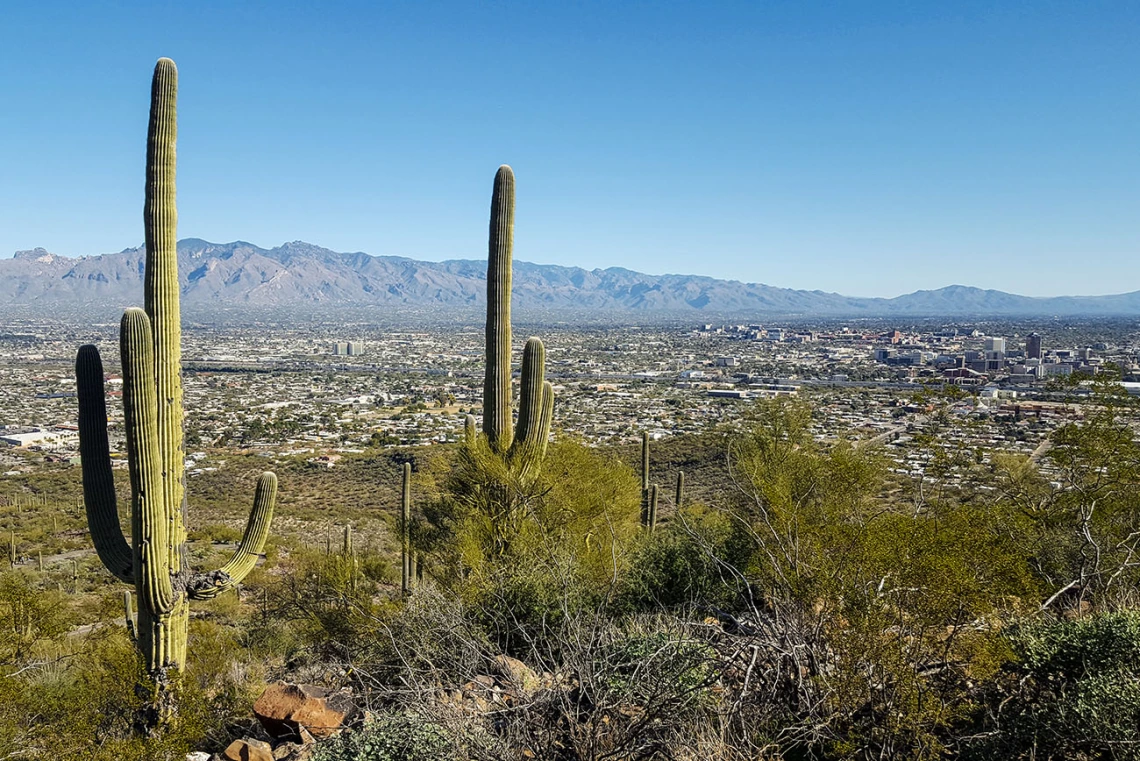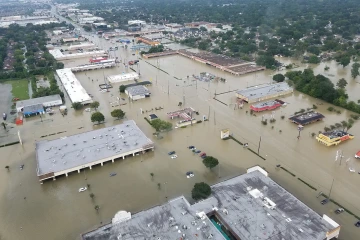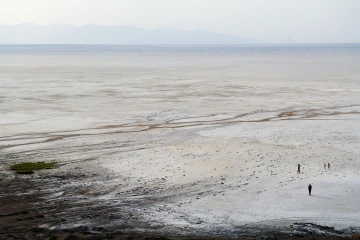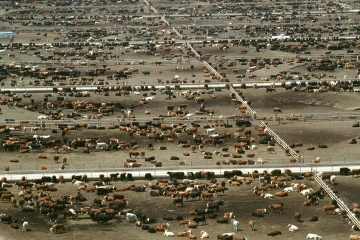A look at the cost of climate change on human health
University of Arizona researchers are setting a broad goal to mitigate the effects of environmental change on human health and performance.

The arid climate of the Southwestern U.S. provides researchers at the University of Arizona with a real-world laboratory to study the effects of climate change on human health both locally and across the globe.
The evidence is clear – climate change is having a negative effect on our physical and mental health. The scale of the impact is vast, with millions of people around the world already facing the consequences of climate change daily.

Flooding caused by heavy rains and storm surge make hurricanes a dangerous and destructive natural disaster. Research suggests that climate change effects could lead to more dramatic increases in hurricane-driven flooding in the years to come.
More than 4 in 10 people live in areas “highly vulnerable” to climate change according to the latest report from the United Nations Intergovernmental Panel on Climate Change. Whether it is spikes in water-borne diseases during the floods in South Sudan, higher temperatures causing premature births in Australia or the bread crisis faced by families in Syria after another year of conflict and failing crops – almost every climate story is also a health story.
At the University of Arizona, researchers are beginning to examine the main ways climate change affects human health. Two working groups have been formed to bring together multidisciplinary experts and resources from across the university to address the effects of climate change on human health.
Climate change is impacting human lives and health in a variety of ways. It threatens the essential ingredients of good health – clean air, safe drinking water, nutritious food supply and safe shelter – and has the potential to undermine decades of progress in global health.
– World Health Organization
Frank A. von Hippel, PhD, professor in the UArizona Mel and Enid Zuckerman College of Public Health, and Nathan Cherrington, PhD, ATS, associate dean of research at the R. Ken Coit College of Pharmacy and director of the Southwest Environmental Health Sciences Center, are leading efforts to further study Arizona’s unique environment and the health effects of the people who live here.
A second working group is focusing on the impacts that climate change has on precision agriculture and precision nutrition. Led by Floyd "Ski" Chilton, PhD, professor at the UArizona College of Agriculture and Life Sciences’ School of Nutritional Sciences and Wellness, and Duke Pauli, PhD, assistant professor at the School of Plant Sciences, the group will use AI and machine learning to explore ways to help redesign global food systems.
The university is situated at the doorstep of a vast, arid climate that is not too dissimilar from other arid climates around the globe that are home to more than two billion people. Because of this, UArizona researchers believe that studying the effects of climate change here will have far-reaching impacts around the globe.
A deeper dive: climate change, food scarcity and nutrition
Many of the indirect impacts of climate change on human health are lost in current conversations, but increasing temperatures, changing rainfall patterns and extreme weather affect the quantity and quality of food being produced.

As CO2 levels rise in the atmosphere, nutritional quality of food decreases. The resulting micronutrient deficiencies may lead to serious physical and mental health consequences.
Globally, 1 in 5 deaths are attributable to poor diets caused by low consumption of healthy foods such as whole grains, fruits and vegetables. Changes in the availability and cost of basic foodstuffs, and declines in the diversity of diets, can quickly lead to increased rates of undernutrition, especially in young children.
In August 2021, the United Nations said that Madagascar was on the brink of the world’s first “climate change famine,” with tens of thousands of people at risk following four years with barely any rain.
All over the world, staple crops like rice, wheat and soybean are getting harder to grow due to hotter temperatures and unpredictable rainfall patterns. The evidence suggests that both the yield of these important food crops and their nutritional quality will fall dramatically.
The sixth assessment report from the UN Intergovernmental Panel on Climate Change highlighted that rising CO2 levels in the atmosphere will reduce the nutritional quality of food. That includes proteins, iron, zinc and some vitamins in grains, fruits and vegetables. Without these critical nutrients, more people will be at risk of micronutrient deficiencies, leading to serious physical and mental health consequences.
Lack of access to sufficient food can have long-term effects that span multiple generations. Underweight babies who are born to undernourished mothers are more susceptible to diet-related diseases in later life. The nutrient scarcity these babies are exposed to in the womb programs their bodies to make the most of every single calorie. Over their lifetime, this puts them at greater risk of conditions such as obesity, diabetes and heart disease. They are more likely to die young compared to healthy babies who are born to healthy mothers.
A changing diet for a changing planet

Studying the environmental effects of climate change in arid climates, where nearly 30% of the world’s populations lives, is a priority for UArizona researchers.
The good news is that many adaptation and mitigation options exist. Research shows that eating healthier can help fight the climate crisis. If regions with diets high in calories and animal-sourced food eat more plant-based foods, it will significantly reduce mortality from diet-related risks and improve health.
Of the 14,000 existing edible plant species with excellent nutritional profiles, less than 200 are currently used. Around 75% of the world’s food comes from just 12 plants and five animal species. Only 30 plants fuel 95% of the calories consumed globally, with 60% of those coming from just three staple crops: rice, wheat and corn. This homogeneity is increasing, with a report showing that similarities in the types of foods consumed across countries rose by 36% from 1961 to 2009.
A global food system that relies on and produces only a few types of food is vulnerable to disruption by killer crop and animal diseases and pests. Climate change is creating conditions in which these pests and diseases are more likely to thrive.
The banana is an example of a crop that was intensively selected to favor the industrial food production system and has been made vulnerable by its lack of diversity. There are hundreds of banana varieties, but it had been cultivated into a dominant Gros Michel species, which eventually succumbed to a soil fungus that nearly wiped it out in the 1950s. Gros Michel was replaced by the Cavendish species most people eat now, which is again at risk of disappearing due to another spreading fungus.

UArizona Health Sciences is collaborating with researchers across campus that are already using technology to drive precision agriculture and precision nutrition research. This includes developing drought-resistant crops and other food sources.
There are efforts to future-proof coffee with the rediscovery of a forgotten species called Coffea stenophylla, which was found to have better climate resilience compared to current species dominating global coffee consumption. This species, also known as highland coffee or Sierra Leone coffee, or more popularly referred to as the “lost coffee species,” originates from West Africa.
Re-discovered in 2018 growing wild in the forests of Sierra Leone, it is currently not commercially cultivated to an extent approaching the two dominant species, Coffee arabica and Coffee canephora, but its taste resembles arabica. Importantly, its robust, drought- and pest-resistance makes it an attractive option to address the rapid decline in production of the two main plant species, which are hypersensitive to global warming.
Moving forward into an uncertain future
The world is clearly aware of climate change as a phenomenon and its effect on temperature, weather patterns and increased natural disasters. But a general awareness of its wide-ranging consequences on human health is lacking.
While mitigation provides global benefits, adaptation often happens on a regional or local level. At the University of Arizona, researchers are exploring ways to adapt to life in a changing climate, including investing in a One Health approach to research.
Working together – within UArizona Health Sciences, across the University of Arizona and beyond our borders – is the only way to solve what is not only an urgent environmental challenge, but a critical human health challenge as well. Connecting the dots between climate change and its impact on human health will allow UArizona Health Sciences researchers and physician-scientists to continue to fulfill their mission of building healthier communities for all.
Our Experts
Frank A. von Hippel, PhD
Professor, Mel and Enid Zuckerman College of Public Health
UArizona Health Sciences One Health Research Initiative
Nathan Cherrington, PhD, ATS
Professor, Pharmacology and Toxicology , R. Ken Coit College of Pharmacy
Associate Dean, Research and Graduate Studies, R. Ken Coit College of Pharmacy
Director, Southwest Environmental Health Science Center
Member, BIO5 Institute
Floyd "Ski" Chilton, PhD
Director and Professor, School of Nutritional Sciences and Wellness, College of Agriculture and Life Sciences
Cancer Prevention and Control Program, UArizona Cancer Center
William "Duke" Pauli
Assistant Professor, Plant Science, UArizona College of Agriculture and Life Sciences
Contact
Stacy Pigott
Health Sciences Office of Communications
520-539-4152
spigott@arizona.edu

